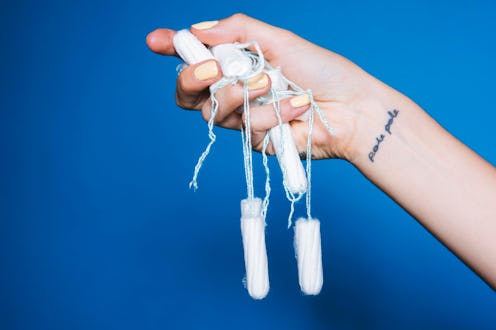Life
7 Unexpected Things Most Women Don’t Know About Their Period, According to OB/GYNs

There aren't many opportunities for women to learn much about the way their menstrual cycle works. Sex-ed barely skims the service, and most of us rely on the internet or quick visits to our doctor for information. Because of this, there are a number of things women don't know about their period, and some of this information might come as a surprise to you. When it comes to your menstrual cycle, there's a lot more going on than we might realize.
"Even though this is a natural process that [...] women go through, it is not necessarily communicated well as to why we have periods, what that means, and what to look for when things seem not right with our cycles," Jessica Vaught, MD, a gynecologist at Winnie Palmer Hospital for Women & Babies, tells Bustle. "Menstrual cycles can be considered a taboo topic, and if mothers weren’t properly educated, then they cannot educate their daughters. And so the cycle continues."
Beyond the symptoms of PMS, how long our periods last, and how we need to take care of them, most of us aren't well-versed on all things menstruation. Here are seven unexpected things that most women don't know about their periods, according to OB/GYNs.
1You Lose Less Blood Than You Realize
When you're in the midst of your period, it can seem like your bleeding buckets. But you might be surprised to learn that the amount of blood you're actually losing is less than you think. "Many women will think that they are losing tremendous amounts of blood, when more commonly, a woman will lose anywhere from a few tablespoons to one cup of blood," Dr. Vaught says. "The fluid that comes out is a mixture of blood and menstrual tissue and that is why it can seem like more than it actually is."
2It's Possible To Get Pregnant During Your Period
Pregnancy can still happen when you have sex during your period. "Sperm can live for up to five days, so if you have intercourse at the end of your cycle and then you ovulate, theoretically the sperm could hang around until ovulation," Dr. Vaught says. "It is rare, but it can happen."
3Menstrual Blood Can Flow Backwards
You would think your bloodstream could only go down, but it's actually possible for menstrual blood to flow backwards. "Menstrual blood can flow backwards into the fallopian tubes, deposit on the ovaries and other structures in the pelvis and abdomen," Dr. Kim Langdon, OB/GYN at Parenting Pod tells Bustle. This is one of the causes of endometriosis, and you should speak to your doctor if you have any symptoms that indicate you might have it.
4Your Voice Changes With Your Menstrual Cycle
Your voice changes with your menstrual cycle thanks to your changing hormones. "The first seven days of the menstrual cycle, your voice is deeper and harsher due to water retention in the membranous linings of your throat," OB/GYN Kecia Gaither, MD, MPH, FACOG, tells Bustle. "As your estrogen levels elevate, you begin to lose the excess bodily fluid, and your voice becomes 'lighter' and clearer."
5Painless Periods May Mean You're Not Ovulating
You might be jumping for joy if you never are plagued with cramps, bloating, or mood swings, but completely symptom-less periods could be a sign something is off with your cycle. "If your periods are completely painless and just come whenever with no warning such as even the slightest cramping or breast tenderness, then you may not be ovulating regularly," OB/GYN Dr. Adeeti Gupta, tells Bustle. "Regular periods with moliminal symptoms are a sign of regular ovulation." While having too much pain isn't good either, if you aren't having any symptoms and suspect this is the case, speak with your OB/GYN.
6It's Common For Your Period To Stop & Start
Nothing is worse than thinking your period is over, only for it to return a day later. But it turns out, this is pretty common. "Some women may get a period for a day, then no bleeding for a day, and then a full period again," says Dr. Gupta. "It could be a normal pattern for them."
7Tampons Can't Get Lost
If you've ever feared that a tampon would somehow get stuck inside of you and become lost forever, fear no more. Thankfully, this isn't possible. "Tampons cannot be lost," OB/GYN and RealSelf contributor Lichun Huo tells Bustle. "The vagina is a closed pouch, and the tampon cannot wander beyond the vagina." Your vagina is only three to four inches deep, so a tampon can't go very far. However, it is possible for it to have gone deep enough that it turned sideways, but it won't disappear completely.
Periods may not be the most talked-about topic, but learning more about your menstrual cycle can help you get in touch with your body.